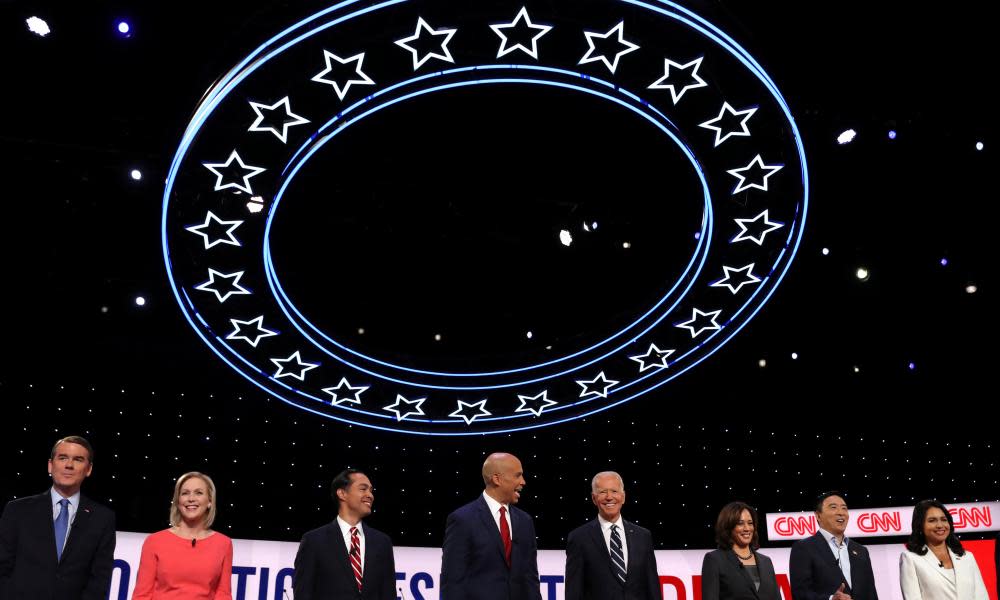Democrats need to remember: 2020 won’t be decided by 2019's debate responses

It is as inevitable as new temperature records in an era of global warming. Every Democratic debate prompts a wailing wall of pundits and prognosticators lamenting how the party has lurched too far left to defeat Donald Trump.
The debate formats accentuate the problem, with TV moderators stoking controversy with their questions and rigid time constraints (CNN in Detroit limited responses to 15 and 30 seconds) making every candidate sound shrill. Trailing candidates, desperate to qualify for the next debates, also have incentives to launch ideological attacks in hopes of creating a viral moment.
Related: Biden came out to fight – and then the desperate brawlers turned on him | Richard Wolffe
Yet the editorial page odes to dynamic moderation have some validity. In an ideal universe, the Democrats would be assembling a broad-based never-Trump alliance ranging from actual socialists to principled libertarians like Justin Amash. The closest analogue would be the anti-fascist Popular Front coalitions on the left that governed France and Spain in the mid-1930s.
But to paraphrase Donald Rumsfeld: “You go to war against Trump with the candidates you have, not the candidates you might want.”
To win the 2020 Democratic nomination, candidates have to (warning: shocking insight ahead) appeal to Democratic voters. And in the midst of a climate crisis and Gilded Age-style economic inequality, it should not be surprising that Democratic voters aspire to more than just a president who promises not to type racist tweets or to coo over Kim Jong-un.
In an ideal universe, the Democrats would be assembling a broad-based never-Trump alliance ranging from actual socialists to principled libertarians
So how self-destructive are the Democrats being as they launch the usual bidding wars to woo activist voters six months before the opening-gun Iowa caucuses?
Forgive me for not rending my garments in horror over Democratic rhetoric.
It seems unlikely that there are many potential anti-Trump voters (with the exception of a few right-of-center columnists) who turned on the CNN debates and decided that a mendacious, Vladimir Putin-loving, would-be autocrat in the White House is better than the 2020 Democrats.
Under the traditional model for American presidential politics, winning candidates veer left (or right for the Republicans) in the primaries and then scamper back towards the center for the general election. So the real question is whether the leading Democrats have already staked out positions that would prevent the eventual nominee from modulating his or her tone in the fall of 2020.
This is where it gets tricky.
The most seemingly radical proposition offered so far is the Massachusetts senator Elizabeth Warren’s 2% wealth tax on fortunes more than $50m that her campaign projects will raise $2.75tn over 10 years. While this proposal may scare the residents of Park Avenue penthouses and Silicon Valley mega-mansions, it polls surprisingly well with general election voters. An April national survey by Quinnipiac University found that 60% of the voters (including a startling 32% of Republicans) approve of such a levy on the super-rich.
The appeals of both Warren and the Vermont senator Bernie Sanders are rooted in their authenticity as dedicated battlers against economic injustice. If they suddenly began to preach about the virtues of patience and incremental steps, they would be derided as typical politicians willing to swap principle for power.
Campaign statements are also not binding legal documents. Already, the California senator Kamala Harris has abandoned her reflexive support for the elimination of private insurance under the rubric of Medicare for All. Her new position, unveiled right before the Detroit debate, features “a 10-year phase-in period”. It is now so complicated that the healthcare section on her website begins by complaining: “One of the problems with our politics is that it often demands 60-second soundbites.”
Does that healthcare adjustment make Harris a flip-flopper?
That was the dread accusation that the Republicans brandished against John Kerry in 2004. But it is hard to worry about that label in 2019 since objective truth no longer exists in the Trumpian political universe. Regardless of what the Democrats say in the debates, Trump will viciously portray his opponent as a socialistic America-hater in love with open borders and rat-infested inner cities.
After covering the 2016 Hillary Clinton campaign, I better understand the value of inspiration and the danger of consultant-driven caution. Remember, it was just seven years ago when Joe Biden got ahead of Barack Obama by endorsing gay marriage. Should the Democrats really have stuck with the seemingly safe 2012 moderate position of backing civil unions?
Fifteen months before the 2020 election, it is nearly impossible to know the best way of wresting power from Donald Trump. But it is safe to predict that the race will not be decided by a few intemperate debate answers in the summer of 2019.

